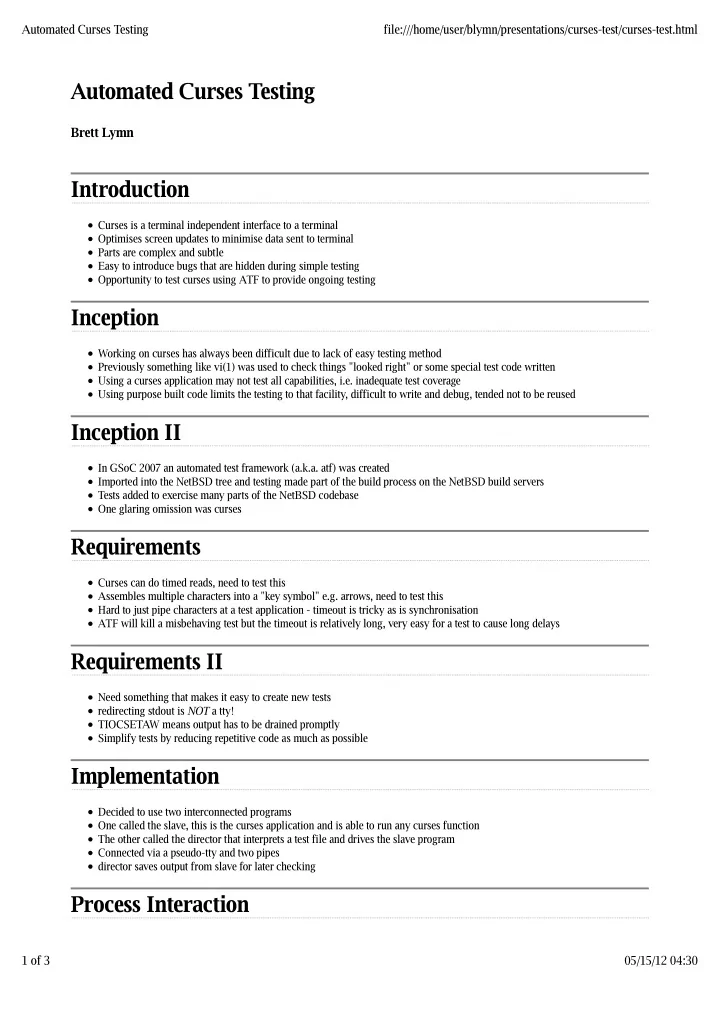

Automated Curses Testing file:///home/user/blymn/presentations/curses-test/curses-test.html Automated Curses Testing Brett Lymn Introduction Curses is a terminal independent interface to a terminal Optimises screen updates to minimise data sent to terminal Parts are complex and subtle Easy to introduce bugs that are hidden during simple testing Opportunity to test curses using ATF to provide ongoing testing Inception Working on curses has always been difficult due to lack of easy testing method Previously something like vi(1) was used to check things "looked right" or some special test code written Using a curses application may not test all capabilities, i.e. inadequate test coverage Using purpose built code limits the testing to that facility, difficult to write and debug, tended not to be reused Inception II In GSoC 2007 an automated test framework (a.k.a. atf) was created Imported into the NetBSD tree and testing made part of the build process on the NetBSD build servers Tests added to exercise many parts of the NetBSD codebase One glaring omission was curses Requirements Curses can do timed reads, need to test this Assembles multiple characters into a "key symbol" e.g. arrows, need to test this Hard to just pipe characters at a test application - timeout is tricky as is synchronisation ATF will kill a misbehaving test but the timeout is relatively long, very easy for a test to cause long delays Requirements II Need something that makes it easy to create new tests redirecting stdout is NOT a tty! TIOCSETAW means output has to be drained promptly Simplify tests by reducing repetitive code as much as possible Implementation Decided to use two interconnected programs One called the slave, this is the curses application and is able to run any curses function The other called the director that interprets a test file and drives the slave program Connected via a pseudo-tty and two pipes director saves output from slave for later checking Process Interaction 1 of 3 05/15/12 04:30
Automated Curses Testing file:///home/user/blymn/presentations/curses-test/curses-test.html Test Language The director has a built in test language parser able to set and use variables supports integers and strings can perform a simple bit or of integers validates return values Test Language II supports nested include files up to a compile time limit (32 currently) note that variables are not scoped so include files can modify can define input for the slave can define timing of the input to the slave to test inter-character timeouts compares slave output against a file of expected output Test Language - Returns Returns can be assigned to a variable or validated immediately Expected values can be any type or one of ERR, OK, NULL, NON_NULL Special command to validate the contents of a variable rules for return by reference simple, call parameters are shifted to the LHS in the order they occur, so: int getyx(WINDOW *win, int y, int x) Becomes: call2 OK y x getyx $win Test Language - Output Validation The director continuously saves output from the slave in a dynamic buffer This data can be validated against expected output at any stage during the test Writing the expected output is the most difficult, did not want to just capture current output Output analysis is made easier by a custom terminfo entry to make the output more readable Terminfo structured so it can be "translated" into real escape sequences mechanically Need to be careful about some terminfo capabilities so they don't affect curses output behaviour 2 of 3 05/15/12 04:30
Automated Curses Testing file:///home/user/blymn/presentations/curses-test/curses-test.html Sample Test Files include start call win1 newwin 2 5 2 5 check win1 NON_NULL call OK wprintw $win1 "%s" "hello" call OK wrefresh $win1 compare wprintw_refresh.chk include window input "input\n" call2 OK "input" wgetstr $win1 compare wgetstr.chk call OK wrefresh $win1 compare wgetstr_refresh.chk Conclusion More tests need to be written Already found some bugs due to analysis At the moment wide functionality cannot be tested, needs thought on how to handle this Framework need not be limited to just curses other curses based libraries like libform, libmenu could be tested 3 of 3 05/15/12 04:30
Recommend
More recommend